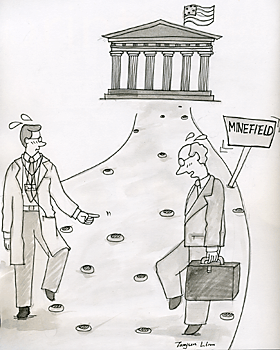
Illustration by Taejun Lim
|
|
By Alan Eder
Arizona Daily Wildcat
Wednesday, October 19, 2005
Print this
Today's value wars are so heated because we, as voters, never get to decide. We feel so angry because issues such as abortion and religious displays in state institutions are not being decided by "we the people," but rather by the courts.
A new controversy in this legal minefield currently envelops an Oregon law. Known as the Death With Dignity Act, the law allows willing doctors to prescribe medications that terminally ill patients take to end their lives.
Started as an initiative in 1994, the measure was twice approved by Oregonians, once upon its inception and later against its repeal. After the law's reaffirmation, Oregon became the only state allowing physician-assisted suicide.
Now, even after support by the will of the people, the Oregon law is under fire again, in a pending case before the Supreme Court, Gonzales v. Oregon. Former Attorney General John Ashcroft initially brought suit against the law in 2001 by deciding that doctors should lose their federal prescriptions powers if they followed the law's procedures and prescribed the medications.
An injunction was issued to prevent prosecution of physicians, and current Attorney General Alberto Gonzales is appealing the case. He claims that the Oregon law runs afoul of the Controlled Substances Act of 1970, since administering lethal doses of medications may constitute drug abuse and fall outside the sphere of prescribing drugs for "legitimate medical practices."
Here, the case will be decided on the tenets of federalism, but the moral undertones will still likely be apparent. The Supreme Court should shy away from the ethical implications and consider the federal merits of the case.
The quandary of physician-assisted suicide was already settled in 1997, in the case of Washington v. Glucksberg, in which late Chief Justice William Rehnquist argued in his majority opinion that the Constitution does not grant a right to physician-assisted suicide, but recognized that states could continue to experiment with policy.
Rehnquist acknowledged, "Throughout the nation, Americans are engaged in an earnest and profound debate about the morality, legality and practicality of physician-assisted suicide. Our holding permits this debate to continue, as it should in a democratic society."
The current suit by Gonzales is nothing more than a bogus attempt to shut off the debate.
The Controlled Substances Act does not apply to the Death With Dignity Act because it falls outside the scope of federal law. In 1998, Ashcroft called upon then-Attorney General Janet Reno to block the Oregon law, but she refused, claiming "the federal government's pursuit of adverse actions against Oregon physicians who fully comply with that state's Death With Dignity Act would be beyond the purpose of the CSA."
The purpose of the Controlled Substances Act is to combat drug abuse and control drug trafficking. But within the legal framework of the Death With Dignity Act, such behavior is not worrisome because certain safeguards are in place.
Patients who want to end their lives must follow specific procedures. Patients must have a life expectancy of less than six months (determined by two doctors), must be mentally competent, must make two requests (witnessed by two people) and must be advised of all alternatives, like hospice care and pain management. The doctor then prescribes the drugs but may not administer them.
In this manner, prescribing medications does not constitute drug abuse. Patients take the medication with explicit intention of ending their lives; abuse does not occur because they do not repeat use of the drug. It is a legitimate medical practice to comfort and console a patient, and by giving legal medications that eases inevitable death, this aim is achieved.
Consequently, the greater issue is about a person easing his or her own pain and federal officials in Washington denying their right. By attacking the measure, the current administration is merely using the Controlled Substances Act as a means of subjugating state authority and abrogating the will of voters.
The Controlled Substances Act does not give the federal government the power to regulate the practice of medicine, an area traditionally regulated by the states.
When the justices realize that the Oregon law does not violate the Controlled Substances Act, nor is it within the federal scope to punish doctors for following state law, they would be wise to let the citizens decide this issue. When a person's medical and spiritual possibilities are exhausted, I for one will not fault him or her for wanting to pass with dignity and end his or her suffering.
Alan Eder is a senior majoring in political science and Spanish. He can be reached at letters@wildcat.arizona.edu.
